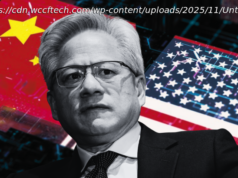Both nations are pursuing policies controlling their domestic internet along the lines of a cybersecurity pact signed in 2015.
A new law in Russia has been signed by President Putin banning the use of software which could keep people anonymous to the nation’s internet surveillance tools.
In China, the reinvigorated enforcement of an existing law has led to Apple withdrawing a number of apps from the App Store which allowed users to browse the internet over a virtual private network (VPN) .
VPNs are used by businesses to protect their internet communications from third parties, but they are also a popular means of circumventing China’s „Great Firewall“ through which Beijing exerts strict control over what its citizens can see on the internet.
Apple said it was working in compliance with Chinese laws, which critics have alleged are attempting to stifle free speech and citizens‘ access to information critical of the government.
Foreign businesses operating in China have also expressed concern at the crackdown on privacy technologies which they are worried may disrupt their operations and jeopardise trade secrets.
In Russia and China the anonymous and secret use of the internet is often used as a safe means of communicating criticism of the authoritarian regimes.
Both countries, which signed a cybersecurity pact in 2015, have sought to crackdown on this use of the internet in recent months.
They have also engaged in military cooperation, performing joint naval exercises in the Baltic Sea where NATO holds its annual training operations.
The cybersecurity agreement mainly established non-aggression between the two countries, both of which are regularly accused of supporting attacks against Western nations.
However, it also stressed the concept of „cyber sovereignty“ – in which their respective governments could control and monitor everything that their citizens‘ had access to online.
Apple has also removed apps by The New York Times from the app store in China following a government request.
At the time, the co-founder of anti-censorship group Greatfire.org – using the false name Charlie Smith – said it was unclear if the internet services industry would comply with China’s orders to expose VPNs.
He said of the firms: „They will push back, quietly… if they deem the cost of running these checks to be too high.“
Speaking to Sky News, the executive director of Privacy International, Dr Gus Hosein, said: „This is the end of the internet as we know it.
„The internet was supposed to move packets around without regard to geography. Security was an add-on once we realised its importance.
„Over the past twenty years industry and governments collided and colluded, resulting in national walls built up against free speech and walls to protect ourselves are torn down.
„Russia is a sign of things to come. China and Apple also is a sign of the future. Unless we change things now, the internet will become a santised commercial space free of value.“






